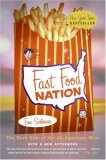Summary | Excerpt | Reading Guide | Reviews | Readalikes | Genres & Themes | Author Bio

Critics' Opinion:
Readers' Opinion:
First Published:
Jan 2001, 288 pages
Paperback:
Jan 2002, 384 pages
In the early 1970s, the farm activist Jim Hightower warned of "the McDonaldization of America." He viewed the emerging fast food industry as a threat to independent businesses, as a step toward a food economy dominated by giant corporations, and as a homogenizing influence on American life. In Eat Your Heart Out (1975), he argued that "bigger is not better." Much of what Hightower feared has come to pass. The centralized purchasing decisions of the large restaurant chains and their demand for standardized products have given a handful of corporations an unprecedented degree of power over the nation’s food supply. Moreover, the tremendous success of the fast food industry has encouraged other industries to adopt similar business methods. The basic thinking behind fast food has become the operating system of today’s retail economy, wiping out small businesses, obliterating regional differences, and spreading identical stores throughout the country like a self-replicating code. America’s main streets and malls now boast the same Pizza Huts and Taco Bells, Gaps and Banana Republics, Starbucks and Jiffy-Lubes, Foot Lockers, Snip N’ Clips, Sunglass Huts, and Hobbytown USAs. Almost every facet of American life has now been franchised or chained. From the maternity ward at a Columbia/HCA hospital to an embalming room owned by Service Corporation International — "the world’s largest provider of death care services," based in Houston, Texas, which since 1968 has grown to include 3,823 funeral homes, 523 cemeteries, and 198 crematoriums, and which today handles the final remains of one out of every nine Americans — a person can now go from the cradle to the grave without spending a nickel at an independently owned business.
The key to a successful franchise, according to many texts on the subject, can be expressed in one word: "uniformity." Franchises and chain stores strive to offer exactly the same product or service at numerous locations. Customers are drawn to familiar brands by an instinct to avoid the unknown. A brand offers a feeling of reassurance when its products are always and everywhere the same. "We have found out . . . that we cannot trust some people who are nonconformists," declared Ray Kroc, one of the founders of McDonald’s, angered by some of his franchisees. "We will make conformists out of them in a hurry . . . The organization cannot trust the individual; the individual must trust the organization." One of the ironies of America’s fast food industry is that a business so dedicated to conformity was founded by iconoclasts and self-made men, by entrepreneurs willing to defy conventional opinion. Few of the people who built fast food empires ever attended college, let alone business school. They worked hard, took risks, and followed their own paths. In many respects, the fast food industry embodies the best and the worst of American capitalism at the start of the twenty-first century — its constant stream of new products and innovations, its widening gulf between rich and poor. The industrialization of the restaurant kitchen has enabled the fast food chains to rely upon a low-paid and unskilled workforce. While a handful of workers manage to rise up the corporate ladder, the vast majority lack full-time employment, receive no benefits, learn few skills, exercise little control over their workplace, quit after a few months, and float from job to job. The restaurant industry is now America’s largest private employer, and it pays some of the lowest wages. During the economic boom of the 1990s, when many American workers enjoyed their first pay raises in a generation, the real value of wages in the restaurant industry continued to fall. The roughly 3.5 million fast food workers are by far the largest group of minimum wage earners in the United States. The only Americans who consistently earn a lower hourly wage are migrant farm workers.
Copyright © 2000 Eric Schlosser. Reprinted by permission of Houghton Mifflin Company.





The Funeral Cryer by Wenyan Lu
Debut novelist Wenyan Lu brings us this witty yet profound story about one woman's midlife reawakening in contemporary rural China.
Your guide toexceptional books
BookBrowse seeks out and recommends the best in contemporary fiction and nonfiction—books that not only engage and entertain but also deepen our understanding of ourselves and the world around us.